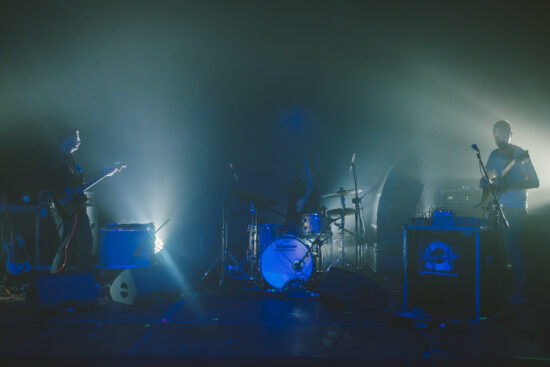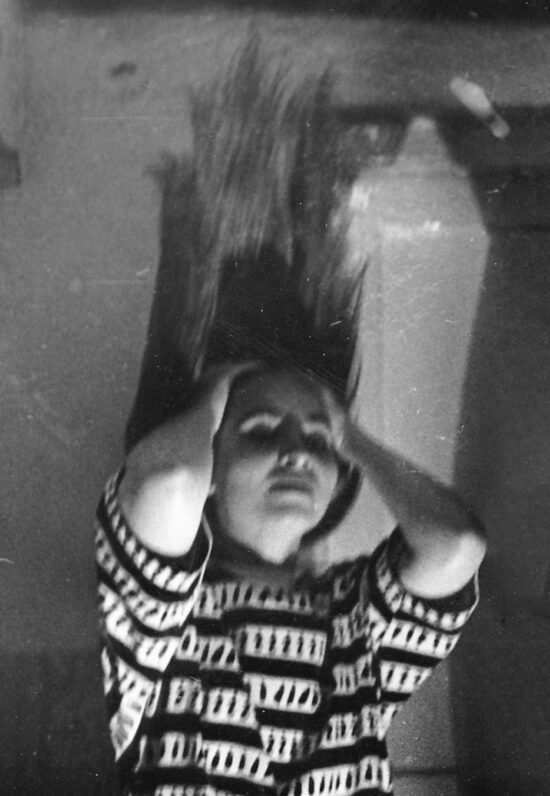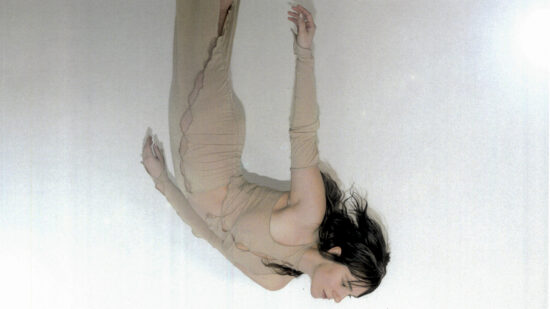Lonker See’s Hamza shows an entirely new side of the band – yet one that’s entirely consistent with their earlier work. In turn, while the meeting of three musicians from Bydgoszcz is no less surprising, the result is completely different to what they’ve been doing so far.
Translation: Aleksandra Szkudłapska
Bartosz Borowski, Lonker See’s guitarist, has recently gone down the memory lane, recalling bands from the Gdańsk-Sopot-Gdynia scene that were a huge influence in his youth – one such concert, more than ten years ago, was when he first met drummer Michał Gos. Borowski, a teenager at the time, represents a completely different generation than Gos, with whom he now shares the stage. Lonker See is an important project for both musicians: I think this line-up, which can be called their working band, is where they’ve finally come into their own and where they can keep developing and modifying their skills, as demonstrated by Hamza.
This is a though-out step ahead: instead of staying on the path marked out by One Eye Sees Red, Lonker See have turned towards a heavier, more complex sound, yet without shying away from what could only be called ‘songs’. Free-jazz mayhem is no longer one of the main elements of their music: the quartet has introduced more structure, but keeps feeling at ease with mighty-sounding repetitions. Michał Gos’s drumming seems calmer, but he’s no less confident in rhythmical, trance forms and can still weather Borowski’s guitar onslaught, like in the finale of “Put Me out”, my favourite on the record. At the beginning of this composition, saxophonist Tomek Gadecki takes to the fore, lyrically cutting across guitar and bass parts. This is not to say that the jazz fraction of Lonker See is in any way toned down – in “3-4”, compulsive saxophone phrases brilliantly chase Gos’s mercurial drumming, with Borowski’s wheezing guitars right behind them. Joanna Kucharska’s vocals are more prominent than ever before – she adds a feminine element to Lonker See’s music, making it even more evocative. This comes through brilliantly in “Open & Close”, where her mantra-like voice maps out the direction of the entire piece, up to its growing finale.
Hamza is more fleshy than her predecessor – instead of the occasionally longish, frivolous forms, here everything is precise, denser, sharper and more boisterous; new-wave reminiscences are very open-form here. The opening “Infinite Garden”, lyrical and mostly built around vocals, smouldering guitar and saxophone, finds a perfect finale in the last track, “Earth Is Flat”, which grows from a saxophone solo to a heavy post-rock suite, ending with Gadecki’s electronic variations. If you’ve thought of Lonker See as a band that transplants their improvised jam sessions onto the stage, Hamza breaks away from that image – the band watchfully keeps to the arrangements, sometimes with mathematical precision, at other times with catchy melodies and trance forms. Each of the musicians seems perfectly at ease. I would even venture to sat that this is the culmination of their work so far – they’re at the top of their game, and this is enhanced by the combination of different contexts in their music. Gadecki, who hails from the free jazz world, has proved that as a saxophonist, he is able to juggle various styles and outshout sonic walls, also through electronic effects. Borowski fine-tuned his ideas for copious riffs and post-rock walls of sound with energy instead of waffly pathos. Michał Gos keeps the rhythmical side of things in check, occasionally allowing himself to explode with free jazz exuberance. Joanna Kucharska’s dense bass often changes the mood of the tracks, while her vocals are a more characteristic element of the record than ever before. All in all, this is a great job, and they also understand each other brilliantly live – Hamza is their best album to date.
I am not sure whether Kuba Ziołek could quote a similar story to Borowski, but I bet that as a teenager, he would have had many opportunities to hear trumpeter Wojtek Jachna and drummer Jacek Buhl at various Bydgoszcz clubs. Their new album is also an intriguing example of intergenerational collaboration – but that’s not the first time they’ve met in a studio (they used to play in Innercity Ensemble and Alameda 5). Animated Music, released by the invaluable Pawlacz Perski (currently my favourite Polish label), refers to animated films from the 1970s and 80s associated with the Polish Radio Experimental Studio – but to me, it functions just as well without this theoretical superstructure. On the one hand, the trio is able to build ethereal, rhythmical, evolving structures, such as “War”, where the ambient background and electrified rhythm created by Ziołek is supplemented by percussion instruments, with the trumpet moving to the fore. On the other hand, the musicians turn towards tonality, like in “The Boy and the World” – here the music is motionless, and Ziołek’s delicate electronic patches are brilliantly counterpointed by the trumpet and metallic, subtle percussion.
Interestingly, the structure of their compositions is rather straightforward – electronic background with glimmering spots, Buhl’s percussion instruments and Jachna’s passages on the cornet or trumpet – but in practically every track, these elements are served in different proportions, as a result of which the entire record has a very diverse sound. These changes do not disturb the narrative of Animated Music, which has a good, engrossing flow to it. Even if the trio turns towards sonorism (the amazing “In the Magic Garden”), instead of distracting the listener, they attract the attention with details and coherence. Members of the Bydgoszcz/Toruń scene, with ‘additions’ in the form of musicians from other cities, really often cross paths in various projects, and I have to say that some ensembles end up eating their own (or someone else’s) tail. Ziołek, Jachna and Buhl’s album is both unexpected and fresh, with the music being very free and different from the aforementioned groups. Ziołek delves deep into electronics, at a hitherto unprecedented scale. Buhl plays very frivolously, not necessarily in the rhythm layer, but he does get carried away. Jachna uses wind instruments to build space, moving very far from jazz mannerisms. Altogether, this is a very intriguing combination – of three theoretically very characteristic musicians, who show us an entirely different, yet equally attractive side of their music.
Lonker See, Hamza, Antena Krzyku
Jahna Ziołek Buhl, Animated Music, Pawlacz Perski




